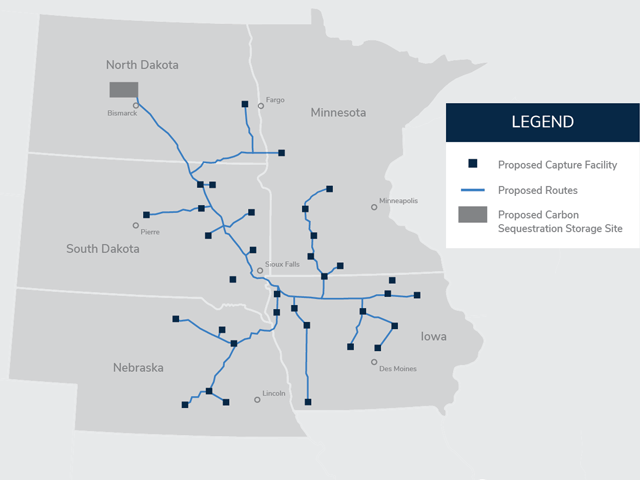Iowa Bill Complicates CO2 Pipelines
Iowa Senate Passes Bill Expected to Create More Barriers For CO2 Pipelines
LINCOLN, Neb. (DTN) -- The Iowa Legislature moved one step closer on Monday night to make it more difficult for companies to use eminent domain to build carbon pipelines in the state, leaving the future of the proposed Summit Carbon Solutions pipeline connecting to 57 Midwest ethanol plants further clouded.
Summit's proposed 2,500-mile, $8.9 billion pipeline is an important part of helping ethanol producers lower their carbon footprints enough to make ethanol more attractive as a feedstock to produce sustainable aviation fuel.
The pipeline would transport carbon emissions from ethanol plants in Iowa, Nebraska, Minnesota, South Dakota and North Dakota, to underground storage in North Dakota.
House 639 passed by the Iowa Senate, changes the definition of what it means to be a common carrier in the state. The definition is key in determining whether a company like Summit Carbon Solutions qualifies for using eminent domain on such a project.
Whether or not Iowa Republican Gov. Kim Reynolds will sign the bill remains to be seen. The Des Moines Register reported on Tuesday that Reynolds was reviewing the legislation.
The bill has been in the making for several years and will require companies like Summit to work its way through a more complex regulatory process. It is aimed at forcing companies to work on exploring possible alternative pipeline routes and striking voluntary agreements with property owners.
The Iowa Renewable Fuels Association expressed disappointment and said the vote "goes against farmers and ethanol producers" who are looking for new markets for their corn and ethanol.
"IRFA is deeply disappointed by today's vote," IRFA Executive Director Monte Shaw, said in a statement.
"After enduring the largest two-year income drop in history, farmers are desperate to find new markets. CCS (carbon capture and storage) is the key to unlocking massive new demand for ethanol and corn around the world. For three years, IRFA has sought to work on a middle-ground approach that enhanced landowner rights and protections but would allow CCS projects a path forward. While a majority of the Iowa Senate turned their back on Iowa agriculture tonight, IRFA thanks those who stood for common sense."
Summit Carbon Solutions did not respond to DTN's request for comment at press time.
EFFECTIVELY BANS
The IRFA said in the statement the bill effectively bans all CCS projects, even those that "might achieve 100% voluntary easement, by putting permit restrictions in place making them not economically viable."
P[L1] D[0x0] M[300x250] OOP[F] ADUNIT[] T[]
Despite "rhetoric" from supporters of the bill, the IRFA said the measure "fails to enhance" property owner rights and "targets" only CCS projects.
All other privately owned projects including crude oil, wind and solar, would not be affected by the bill.
"For 25 years, Iowa has benefited greatly from being the most profitable place in the world to convert corn kernels into ethanol," Shaw said.
"Once the Tallgrass CCS pipeline in Nebraska begins operations later this year, that will no longer be the case. If this legislation goes into effect there will be very real, very severe economic consequences as others, like Nebraska, North Dakota and Brazil move forward with CCS. Iowa is poised to be left behind. Expansion plans will be shelved and we could see additional plant closures over time as the CCS-enabled plants elsewhere expand."
EXPANDS BARRIERS
If the bill becomes law, it is expected to increase barriers to building carbon pipelines through a 25-year cap for operation, higher costs for insurance, more delays and opposition, and would deter investment.
The Iowa legislation will require pipeline companies to prove their projects are insured enough to cover losses and injury during construction.
Under the new definition of common carrier in Iowa, carbon pipeline companies are not allowed to use eminent domain to acquire property unless they can prove they are selling carbon dioxide as a commodity to someone not affiliated with their companies.
Among other things, the Iowa bill would limit the operating time of carbon pipelines to 25 years.
The IRFA said its members will be asking Reynolds to "stand up for their future and the future of rural Iowa by vetoing this misguided legislation."
The IRFA said it expects to see further economic decline in agriculture throughout 2025.
"CCS is the most cost-effective and impactful tool to unlock new markets that demand ultra-low carbon ethanol, such as heavy-duty engines, ocean-going vessels, rail and sustainable aviation fuel," the group said.
The global market for sustainable aviation fuel alone is expected to be about 100 billion gallons annually, IRFA said, potentially increasing corn grind by billions of bushels.
In November 2024, the Iowa Supreme Court sided with Summit Carbon Solutions in an appeal filed by a Hardin County landowner who fought the company from gaining access to his property to survey for the proposed project.
OTHER STATE BARRIERS
Outside of Iowa, Summit still faces challenges in South Dakota. The state's Public Utilities Commission in April voted 2-1 to again reject Summit's permit application. The state also rejected Summit's permit in 2023. South Dakota also passed a tougher eminent domain bill that was signed into law in March.
Read more on DTN:
"Iowa Supreme Court Sides With Summit," https://www.dtnpf.com/…
"SD Supreme Court Sides With Landowners," https://www.dtnpf.com/…
"Does the Trump Administration Fully Understand Rural Economic Potential of SAF?," https://www.dtnpf.com/…
Todd Neeley can be reached at todd.neeley@dtn.com
Follow him on social platform X @DTNeeley
(c) Copyright 2025 DTN, LLC. All rights reserved.




